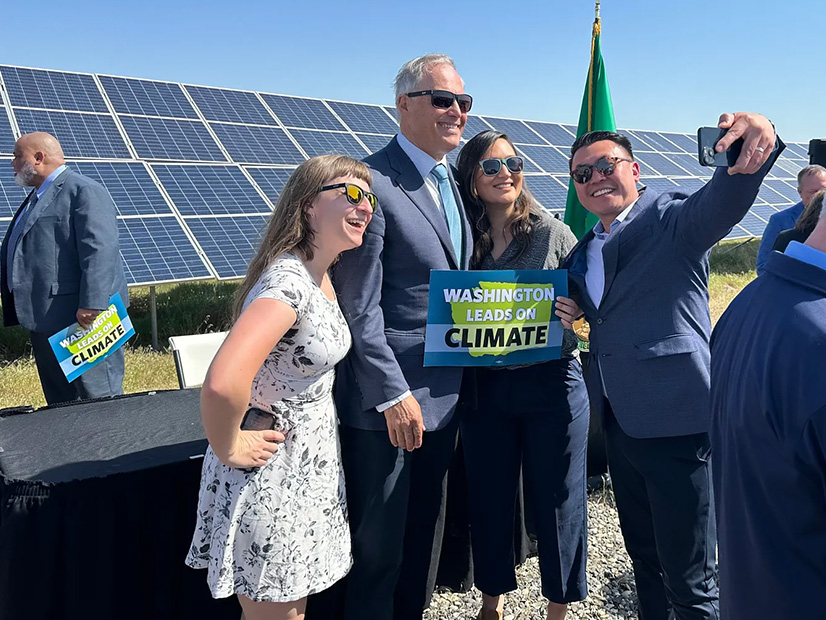
A good chunk of Washington’s 2023 climate change legislation was signed into law Wednesday, including a plan to make the state a center for producing sustainable aviation fuel.
“The world is looking at Washington state to lead a clean energy revolution,” Gov. Jay Inslee said Wednesday at a signing ceremony for seven clean energy bills at Energy Northwest’s Horn Rapids Solar Farm in Richland, Wash., a project that in 2020 received financial assistance from the state’s Clean Energy Fund. “What you see behind me is good paychecks for good jobs.”
Inslee noted that Washington’s solar capacity has increased 460% during the past five years.
One passed bill that was noticeably absent from Wednesday’s signing ceremony was House Bill 1173, sponsored by Tri-Cities Rep. April Connors (R), which would limit the blinking red lights on wind turbines to times when low-flying aircraft were near rather than leaving them on through the night. This legislation was the result of many residents objecting to a plan to build a large wind farm in the scenic Horse Heaven Hills area south of the Tri-Cities. There are rumors that wind power interests have been lobbying Inslee behind the scenes to veto the bill.
“I think it is a grand idea, assuming it will work,” Inslee said. “We are just making sure that it does. But we really appreciate everyone looking for a way to minimize the visual disturbance. We think this will be a tremendous benefit.”
Successful Climate Bills
Here is a rundown of climate-related bills passed in the 2023 session, which ended in late April:
Senate Bill 5447, which is intended to make Washington more attractive to the sustainable jet fuel industry.
The new law sets a business-and-occupation tax rate of 0.275% for any plant that would produce at least 20 million gallons a year of low-carbon jet fuel. The rates for most Washington B&O taxes — a levy on a business’ gross receipts — range from 0.47% to 0.9%.
SB 5447’s purpose is to set up a second West Coast alternative jet fuel plant in Washington. A few years ago, the predicted cost of building such a plant was at least $1 billion.
“Air travel is one of the hardest areas to address (in trimming greenhouse gas emissions),” said Senate Majority Leader Andy Billig (D) at the bill signing. “The production is what brings the economic benefits of the jobs. … That’s the promise of the green economy.”
House Bill 1181, which would add climate considerations to city and county land-use planning.
This law changes Washington’s Growth Management Act, which regulates long-range, land-use planning for city and county governments. It requires local governments to review and, if needed, revise their comprehensive plans and development regulations every eight years.
The law requires climate change to be considered in land-use and shoreline planning for the 10 largest of Washington’s 39 counties and in cities of 6,000 residents or larger. The 10 largest counties cover Puget Sound, Spokane, the Yakima River Valley and the Washington-side suburbs of Portland.
Senate Bill 5165, which requires utilities to begin transmission line planning 20 years in advance, along with some technical changes to transmission planning.
A major driver behind this law is that Washington will transition from being a net exporter of power at present to a net importer by 2050 if it is to reach the goal of weaning itself from fossil fuels, according to calculations by the state’s Department of Commerce. As a result, the state needs to dramatically increase its transmission capacity while simultaneously developing more alternative power sources.
House Bill 1216, which creates an interagency council to improve the siting and permitting of clean energy projects.
It also directs the Washington State University Energy Program to develop a pumped storage siting process. Washington has one pumped storage project in the works, which is controversial because part of it would be on land that the Yakama Nation of Indians considers culturally sacred. (See Wash. Bill Seeks to Accelerate Renewable Buildout.)
Rye Development of Boston is hoping to build Washington’s first pumped storage project for $2 billion in southern Klickitat County near the John Day Dam and have it in operation between 2028 and 2030.
That project would include two lined, 600-acre water reservoirs that are 60 feet deep and separated by 2,100 feet in elevation. One reservoir would be on the river shore and the other at the top of a cliff. An underground pipe would connect the two reservoirs with a subterranean electricity generating station along the channel.
House Bill 1176, which creates the Washington Climate Corps Network to develop climate-related service opportunities for young adults and veterans.
House Bill 1416, which requires “market” — or nonresidential — customers of consumer-owned utilities to comply with the greenhouse gas-neutral standard and the 100% clean electricity standard under the Clean Energy Transformation Act.
House Bill 1236, which authorizes all public transit agencies to produce, distribute, use, or sell green electrolytic hydrogen and renewable hydrogen. “Every transit agency has signed on to this bill,” said Rep. David Hackney (D).


